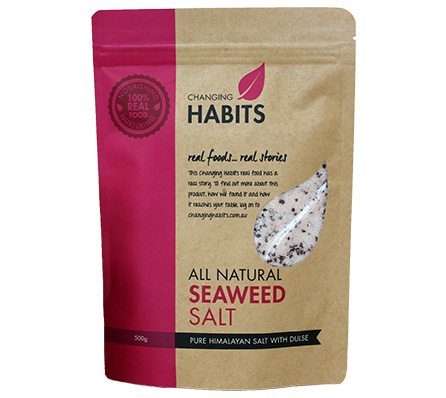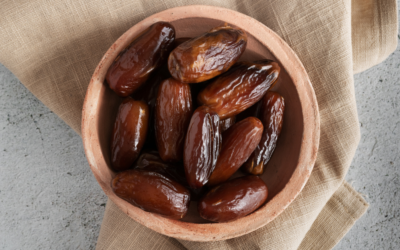As a result of hundreds of requests as to “where” and “what” is dulse and seasalt, we have created the Changing Habits “All Natural Seaweed Salt” to our unique formula for your use.
Himalayan Salt is found in veins flowing beneath the salt mountains in the Himalayan foothills. Salt from this region was formed about 250 million years ago when the energy of the sun dried a primal ocean. The ancient ocean bed was thrust skywards by tremendous geological forces to form the mighty Himalayan Mountain Range. In the process, the pure veins of crystal salt were locked away – waiting to be unearthed.
Unlike normal sea salt, Himalayan Salt is uncontaminated by environmental factors. Better still, Himalayan Salt is renowned for its consistent composition and purity. The composition of the salt is tested regularly and has been shown to consistently contain all the major components of the known 84 mineral and trace elements of Himalayan Crystal Salt.
Organic sea vegetables are a natural medicine treasure chest laden with micronutrients and healthy goodness – Dulse contains Vitamins A, B1, B2, B3, B6, B12, C, and E as well as iron, calcium, potassium, magnesium, chromium, zinc and all the trace elements required by the human body.
Iodine is important for essential hormone development in the human body. Inadequate intake of dietary iodine can lead to an enlarged thyroid gland (goitre) or other iodine deficiency disorders. For more information on iodine deficiency disorders please click here.
Our bodies need iodine to make thyroid hormones. The thyroid is a gland in the throat that regulates many metabolic processes, such as growth and energy expenditure. The two main thyroid hormones, thyroxine and tri-iodothyronine, are synthesised from the amino acid, tyrosine, and from iodide.
The thyroid hormones regulate the body’s metabolic rate and promote growth and development throughout the body, including the brain. If there isn’t enough thyroid hormone circulating in the blood, the brain sends a chemical message to the thyroid gland, which then releases a measured dose of these hormones. If a person’s diet is too low in iodine, the brain keeps sending chemical messages to the thyroid in vain. In an attempt to make more thyroid hormone, the gland gets larger and larger. This overgrowth of the thyroid gland is called a goitre. Long term deficiency can be serious.
An enlarged thyroid gland, or goitre, isn’t the only side effect of inadequate iodine in the diet. Other symptoms include dry skin, hair loss, fatigue and slowed reflexes.
In the developing fetus, baby and young child, the effects of iodine deficiency are serious, including stunted growth, diminished intelligence and retardation. Lack of iodine is a major problem in developing countries and is considered to be the world’s number one cause of preventable intellectual disability in children. Vegetarians may also be at risk of iodine deficiency if they do not eat seafood. Instead they can get their iodine from iodised table salt or seaweed. A study published in Sep-Oct 2003 Annals of Nutrition and Metabolism showed that 25% of the vegetarians, 80% of the vegans and 9% of those eating a mixed diet had low iodine status.
Iodine deficiency is a looming health threat across Australia. Low dietary levels of iodine were thought to be a problem in the past or in developing countries only. However, some researchers suspect that iodine intake levels in Australia have dropped considerably, perhaps by as much as half, over the past few decades. Some reasons for low iodine intake may include:
- A reduction in the use of natural salt in cooking
- Consuming most of our salt in processed foods, which do not contain iodine
- Less iodine in milk because of changes in treatment methods
- Iodine levels in Australian soils may have dropped.
All nutrients such as vitamins, proteins, enzymes, amino acids, carbohydrates, fats, sugars, oils, etc. require minerals for proper cellular function. All bodily processes depend upon the action and presence of minerals.
For proper functioning in the body, vitamins have to work together with minerals since they cannot be absorbed without the aid of minerals. While the human machinery can manufacture some vitamins, it cannot manufacture a single mineral. The importance of minerals is clear when it is realised that all body tissues and fluids contain some of all minerals. Minerals are found in bones, teeth, soft tissue, muscle, blood, and nerve cells.
Food is made up of a variety of very diverse elements. For example: carbohydrates and fats are made up of carbon, hydrogen and oxygen. Proteins are made of carbon, hydrogen nitrogen, sulphur, and phosphorus.
For thousands of years salt has been known as a panacea. Alchemists called it “the fifth element” – besides water, earth, air and fire – because its qualities were comparable only to ether, the actual fifth element. Why are we so drawn to the ocean? Because our subconscious mind instinctively wants to return to the specific vibrational state of the ocean from which we once emerged. This is where we can return to recharge our batteries and regenerate. It was only two-hundred-fifty years ago, with the advent of industrialisation, that we initiated our disconnection from nature and her ways. Fortunately, we are witnessing a trend to return back to natural, holistic methods for living and caring for our body, including a shift back to utilising natural salts in this process. People everywhere are reconsidering the healing effects of natural crystal salt. We can find it in skin care lotions and for use as bath salts, and it is even used in inhalation or cleansing treatments for illnesses of the respiratory system and for a variety of other indications.





Seaweed Salt
Found this salt very supportive on my carnivore diet, drinking small pinch in the morning. Took away muscle weakness and feeling of fatigue within 10 minutes, while transitioning from carb laden diet. Healing my gut!
That’s so great to hear Vivi! Thanks for your feedback 🙂